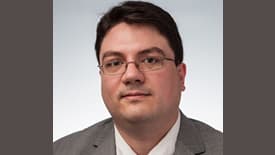CCI professor wins NSF Career Award

Erik Saule, an assistant professor in the College of Computing and Informatics’ Department of Computer Science, has been awarded a prestigious National Science Foundation (NSF) Career Award for his research in graph analytics.
In the last two decades, graphs have been applied to virtually all parts of human activity, such as health, literature, national defense, GPS systems and traffic analysis for urban planning.
The internet and the information age in general significantly increased the amount of data that can be leveraged, which has increased the size of the graphs being studied as well as the complexity of the analyses performed on them. Data analysts cannot easily examine this kind of data as the current software and simple machines cannot easily process the analysis, and utilizing more powerful systems is often out of their skill set.
Saule’s project will help analysts “gain a clear understanding of the performance of graph algorithms on different hardware architectures, to understand which modes of operation are preferable to use, to design new algorithms for the cases where no good solutions exist and to design better algorithms for common use cases. The project develops new algorithmic techniques to perform graph analysis by shortening critical paths, by leveraging vectorization and by replicating data to improve load balance.”
The researcher stated his tools will be used to give insight on how to design better algorithms and to enable picking the best way to perform analysis. Thus, the software, algorithms and models will increase productivity of data analysts by reducing the development burden on the analyst and by efficiently using computing systems to analyze graphs in a timely fashion, he said.
“Urban planning will be greatly impacted by this,” stated Saule. “Graphs of cities will show the connection of streets and traffic flow. The analysis of this information will then provide valuable information to retailers and help them to determine what areas would be best suited for them.”
Saule said his approach will automate the modeling process, thus speeding up the analysis of graphs and eliminate some of the computing power that had been needed in the past. The end result will be a reduction in the use of energy.
The College of Computing and Informatics has seven NFS Career Award recipients among past and current faculty.